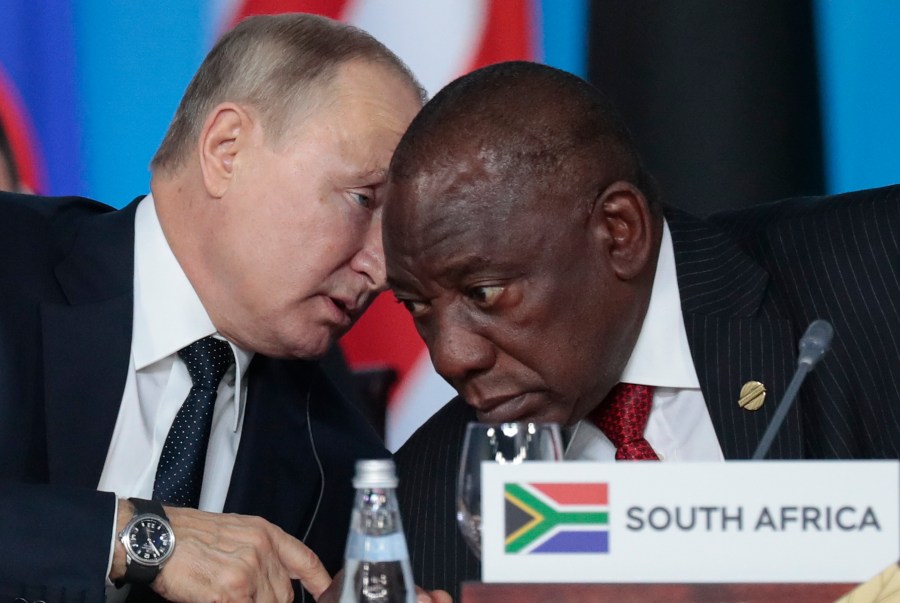
Since the very start of its invasion of Ukraine more than three years ago, Russia’s government has focused a barrage of propaganda on Africa. Western governments have pushed back, while Ukraine is opening its own embassies across the continent to spread its message.
With all this activity, one would expect that the Ukraine conflict would be the talk of the continent.
Not so, however. A recent visit to West and East Africa suggests Russia, Ukraine and the whole East-West conflict still attract only marginal interest among academics, civil society, students and journalists. Rather, the public mood is focused heavily on more local events, particularly government corruption.
This helps explain Moscow’s approach to the region. In its appeals to young Africans, Russia spends little time justifying its invasion of Ukraine. It devotes far more effort to positioning itself as an ally of young, restless populations angry at their local governments and at what they see as Western dominance and diktat.
By doing so, the Kremlin has deftly outflanked the West’s focus on the lawlessness and brutality of the invasion itself. It has concentrated instead on broader issues that resonate far more with local populations. Western communicators need to revise their strategy accordingly.
“A lot of Africans don’t know anything about Russia except as an opponent of the West,” Morité Camara of Côte d’Ivoire’s Institut Afrique-Monde think tank told me. “If people are angry at the West, associating with Russia makes sense since it’s the West’s enemy.”
Western nations have pressed African states to take a strong stance against Russia’s invasion. But African media typically publish little news from abroad. Europe’s biggest war in decades gets play mainly when it threatens Africans’ food supplies, or when African students suffer racist treatment in the war zone.
In my conversations, the international issues cited most often were enduring resentment toward European colonialism; the West’s killing of Moammar Gadhafi and the ensuing destruction of Libya; the U.S.-led intervention in Iraq (which included Ukrainian troops); and present-day American support for Israel.
None of this dims the eagerness of many to study in, or move to, Western Europe or the United States. But politically, university students made clear, the West is still seen as a predatory actor with much to atone for, while Russia looks like an alternative power center that might bring a change to the status quo.
That represents an opening for Moscow. Compared to the chaotic state of Western nations, Russia looks to Africans like a stable, reliable power — whatever internal repression the Kremlin may use to keep it that way. Vladimir Putin, whose image is painted on the occasional minibus in Nairobi, comes across as a tough leader who gets things done.
Western analysts often give Russian propagandists credit for the anti-French and anti-corruption mood that fueled coups in recent years in Sahel nations. That’s understandable, given that the overthrow of governments in Mali, Niger, Burkina Faso and Chad sharply increased Russian influence in the region. But the reality is more complex; Russian information operations amplify the feelings of Africans across the continent who are resentful toward the West and looking for any alternative.
Older Africans remember with gratitude Soviet aid to the continent’s national liberation movements during the decades of the Cold War. At the same time, Africa is the world’s youngest continent, with an average age of 19, and Russia is skilled at reaching out to the younger cohort as well. Moscow offers scholarships to Russian universities, promotes the Russian Orthodox faith (many young Africans are religious) and aligns itself with populations discontented with the continent’s remaining pro-Western governments.
Russia’s tactics are shrewd. Actual Russian development aid to Africa is minimal, concentrating mainly on mining and other deals that help enrich Russian and local elites. But Russia excels at building networks of social media influencers and pseudo-news brands to intensify anti-Western and anti-corruption feelings in Africa’s remaining pro-Western nations. This threatens the stability of their governments and intimidates them into remaining at least neutral in the standoff between the West and Moscow.
All this calls into question the West’s own messaging to Africa. Western communication has tended to support friendly governments and emphasize the value of U.S. ties. Diplomats say they try to avoid attacking Moscow, worried it would feed an image of great powers squabbling with each other while ignoring Africa’s needs. Perhaps as a result, few Africans know much about racism in Russia, or that political freedom in many African countries far exceeds what Russians enjoy.
These points are certainly worth making. But to be more responsive to African concerns, U.S. outreach also needs to more effectively emphasize fighting corruption. Even if such policies weaken pro-Western regimes now in power, their days may be numbered. If angry young people or the military sweep them away, the West’s interests should not be swept away with them.
When it comes to Africa, the U.S. must remain committed to fundamental political rights and engage in economic projects that benefit populations as a whole, not just the continent’s elites. Doing so would differentiate Washington from Moscow in Africans’ minds, and position America as the partner that will benefit Africa the most.
Thomas Kent is senior fellow for strategic communication at the American Foreign Policy Council in Washington, D.C., and a consultant on Russian affairs and information operations.

